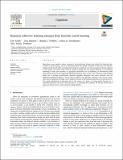| dc.contributor.author | Krafft, P.M. | |
| dc.contributor.author | Shmueli, Erez | |
| dc.contributor.author | Griffiths, Thomas L. | |
| dc.contributor.author | Tenenbaum, Joshua B. | |
| dc.contributor.author | Pentland, Alex | |
| dc.date.accessioned | 2021-07-08T18:10:56Z | |
| dc.date.available | 2021-07-08T18:10:56Z | |
| dc.date.issued | 2021-07 | |
| dc.identifier.uri | https://hdl.handle.net/1721.1/131067 | |
| dc.description.abstract | Researchers across cognitive science, economics, and evolutionary biology have studied the ubiquitous phe- nomenon of social learning—the use of information about other people’s decisions to make your own. Decision- making with the benefit of the accumulated knowledge of a community can result in superior decisions compared to what people can achieve alone. However, groups of people face two coupled challenges in accumulating knowledge to make good decisions: (1) aggregating information and (2) addressing an informational public goods problem known as the exploration-exploitation dilemma. Here, we show how a Bayesian social sampling model can in principle simultaneously optimally aggregate information and nearly optimally solve the exploration-exploitation dilemma. The key idea we explore is that Bayesian rationality at the level of a popu- lation can be implemented through a more simplistic heuristic social learning mechanism at the individual level. This simple individual-level behavioral rule in the context of a group of decision-makers functions as a distributed algorithm that tracks a Bayesian posterior in population-level statistics. We test this model using a large-scale dataset from an online financial trading platform. | en_US |
| dc.language.iso | en_US | en_US |
| dc.publisher | Cognition | en_US |
| dc.rights | Attribution-NonCommercial-ShareAlike 3.0 United States | * |
| dc.rights.uri | http://creativecommons.org/licenses/by-nc-sa/3.0/us/ | * |
| dc.title | Bayesian collective learning emerges from heuristic social learning | en_US |
| dc.type | Article | en_US |
| dc.identifier.citation | Krafft, P. M., Shmueli, E., Griffiths, T. L., & Tenenbaum, J. B. (2021). Bayesian collective learning emerges from heuristic social learning. Cognition, 212, 104469. | en_US |
| dc.contributor.department | MIT Connection Science (Research institute) | |
